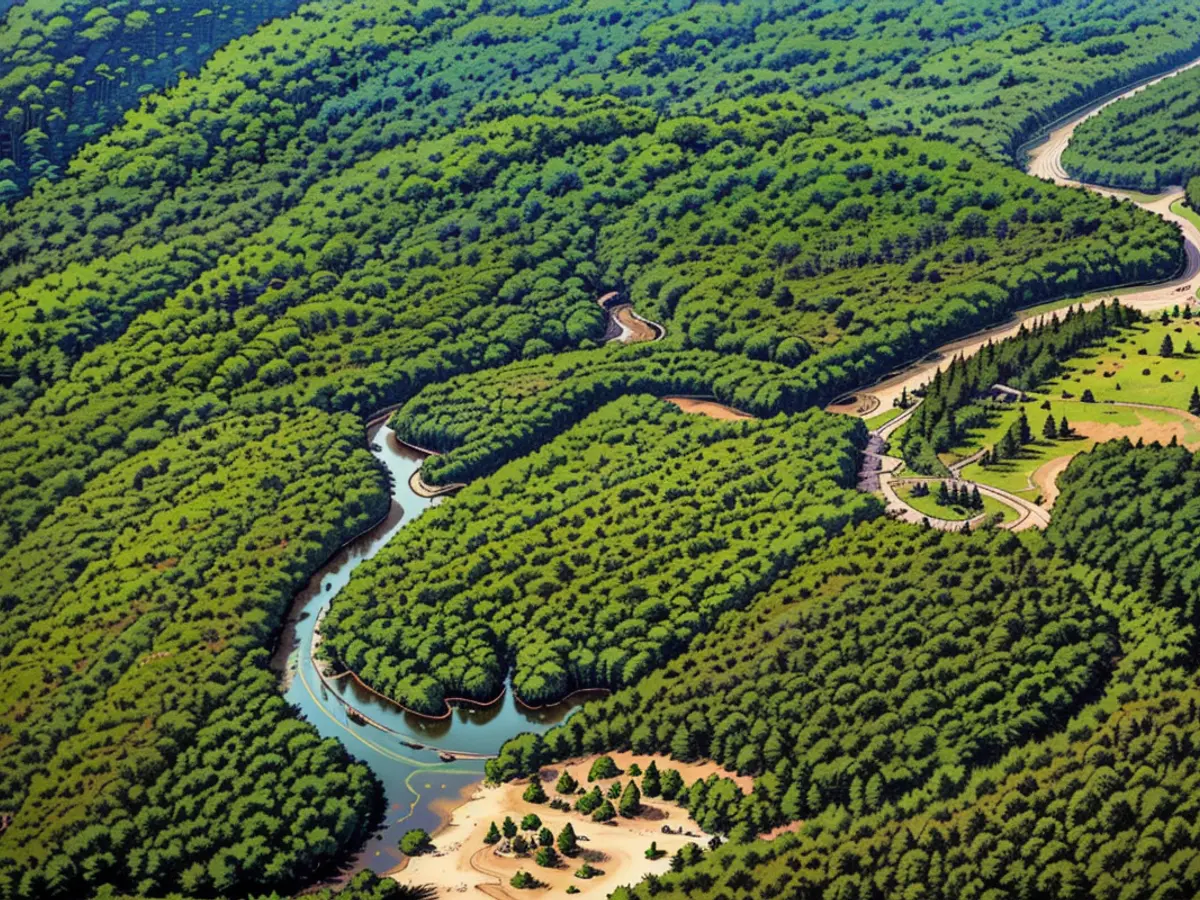"Hugging trees is not an esoteric delicacy"
ntv.de: At the beginning of your book, you describe that you and your husband were going through a marital crisis, which is quite brave. What role did the forest play in overcoming this crisis?
Suse Schumacher: The forest played a very significant role because it comforted and grounded me. This crisis was an emotional exception for me. While I was wandering through the winter forest in my despair, memories of my childhood days came back to me: As a child, I was full of trust and would spend hours alone in the forest, observing animals, plants, and the weather, and it was somehow clear that I belonged there. Life in the city as a working mother of two sons, first in Hamburg, then in Cologne, and now in Berlin, challenged me so much that I forgot my connection to nature. In the forest, all these beautiful early moments of my childhood came back to me. I suddenly knew that this crisis did not mean the end of my life, and that I have the power to decide how to deal with it. Instead of crying as a victim of circumstances, I knew that I had to let go of the old to make room for the new. Even though it was not clear at that moment whether I would stay with my husband, these thoughts gave me courage. In the end, my letting go made it possible for us to come together again. Now, I have been married to my husband for 30 years.
How do I incorporate the forest into my life?
Of course, we can't be in the forest all the time. But it's enough to take a beautiful picture of my last forest visit home and hang it somewhere visible, so that every time I look at it, all the positive feelings associated with it come back to me. Alternatively, I can also remember a beautiful place from my childhood. For many people, these are places in nature. If I imagine myself there with my eyes closed, it has similar effects as if I were actually there. Our sensory body memory is activated and generates the associated positive memories and feelings.
And how do you bring the forest to a city dweller like me, who isn't really into hugging trees, but is generally open to it?
(laughs) First of all, hugging a tree is not some esoteric nonsense, but it boosts our immune system. Trees produce resins to protect themselves, and in them are scent substances, also called terpenes, some of which boost the immune system of humans, thus increasing our killer cells that we need to protect ourselves against invading viruses and bacteria. The forest makes us more resilient and healthier in a way. At the same time, the singing of birds, the rustling of leaves, or the smell of moss, wood, and earth ensure that we relax both physically and mentally. As a city dweller, I would suggest you simply come along on a forest day and be surprised. I'm sure you'll come out different and have a new, different access to the forest on your next visit.
Breathing, meditating, singing, self-care - have we simply forgotten or been trained out of the basic things that can help us? Already in school, for example.
Yes, in my understanding, we have quite disconnected ourselves from our former connection with the forest if you consider that humanity has lived with and in nature for millions of years. Evolutionarily speaking, there's still a nature-girl or -boy in our genes. You can observe this beautifully in small children who play happily and self-absorbed in nature. School, as you mentioned, changes our relationship with nature by teaching cognitive skills like math, reading, writing, and knowledge. Instead of playing outside and experiencing things sensorially, the focus suddenly shifts to sitting still and learning intellectually from the age of six. Additionally, the beginning of industrialization around 250 years ago has ensured that we hardly have a direct connection to nature, for example, to our food. We live behind walls, protect ourselves from nature, and perceive ourselves as separate from it. Indigenous peoples like the Huni Kuin, who live in the Amazon in Brazil and whom I interviewed for my book, show us how it can be different: The Huni Kuin describe themselves as a part of nature. They are the forest.
How important is it to breathe correctly?
Correct, deep breathing is always right, important, and above all, healthy. Firstly, we relax when we breathe deeply into our belly and out again, as the parasympathetic nervous system is activated. When we are relaxed, we think more openly, meaning we find more creative solutions to problems. When we breathe deeply in the forest, we also inhale the terpenes or fragrances of the trees, which support our immune system. If we get into the habit of breathing deeply several times a day, it also helps prevent stress. Even if everyday stress is great, through deep breathing we gain distance from it and act more thoughtfully and calmly in the end, which also benefits our fellow human beings. Therefore, breathing correctly helps enormously.
You write about soul and heart, and I got the impression that the heart is closer to you. What about gut feeling?

Intuition or colloquially "gut feeling" is fed by the heart. The heart is more than just an organ that pumps our blood through the body. It is also a resonance space through which we connect with all that is alive, other people, plants, animals, or perhaps something higher like God. Simultaneously, the heart establishes the connection between body and mind. It is certainly not coincidental that the over 2500-year-old yoga describes the heart chakra as the connecting point between below (body) and above (mind), and the color of this chakra is green. Also, in meditation, when we focus our attention on the breath, it is the chest area, where our heart and lungs are located, that we observe. I am firmly convinced that we should pay more attention to our heart again, also to create a counterbalance to our head-heaviness and thus our thinking. Because the heart does not evaluate, but makes us empathetic and compassionate beings.
You quote Michelangelo as saying that peace is only found in the forest. What about mountains, lakes, sea?
In nature therapy, you learn that each natural landscape has its own quality. The forest stands for the unconscious, the scattered. Simultaneously, the forest offers protection and rest. Michelangelo seems to have found his peace in the forest. However, I would never deny that there are also people who find their peace on a mountain, at a lake, or by the sea.
You're pitting nature against culture - doesn't both work best together? Or alternating between them?
I think it's a matter of perspective. Nature is something that arises on its own and is in constant change. Culture is something humans create, arising from values, rules, and religious concepts, among others. Culture and nature can certainly function together when they are on equal footing. Unfortunately, we still believe we can do anything with nature: we interfere, change, and destroy it instead of protecting and preserving it. This will one day come back to haunt us painfully. That's why one of the aims of my book is to give people ideas on how to become more self-effective and hopefully recognize the treasure we have right outside our doors. It's high time we stand up for the forest and nature and preserve and protect it for our children and grandchildren.
Is a park a "light forest"?
In the end, it's always in the eye of the beholder. It is nature, albeit culturally designed. I would never call the Berlin Tiergarten a forest.
Terpenes, you mentioned them earlier, what exactly are they?
Terpenes are plant signaling molecules released by trees to protect themselves or to induce cloud formation by binding to tiny water droplets that then fall as rain on the earth. Some of these terpenes promote health by strengthening our immune system. It has been proven that the number of our natural killer cells increases during a forest visit, which recognize and destroy damaged, foreign, or virus-infected cells in the body. Studies show that a single day in the forest increases the average number of natural killer cells by 40%. This effect is still measurable seven days later and can be further increased and prolonged by frequent forest visits.
So, a day in the forest and the killer cells bloom. Are we then to blame when we get sick?

I wouldn't use the term "blame" in this context, but rather positively formulate: We can do a lot for our health ourselves. If we get sick, it's usually because an imbalance has occurred in the body, which may be due to our lifestyle. The health-promoting factors such as good nutrition, sufficient sleep, exercise, and social relationships are all well-known. However, if I rigidly stick to all this and forget to live, have fun, laugh, be grateful, love, or simply be happy, then that can also make me sick. Therefore, I think the best way is to keep both in mind: not to worry too much or be overly concerned, and simply be grateful that I live in a democratic country where much is possible.
(laughs) That depends on you. How do you look at your life? Is your glass half empty or half full? There are studies that show that even seriously ill, elderly people who have found a purpose in their life and are grateful for it, perceive themselves as less sick than they objectively are. So, in the end, it always depends on your self-perception and whether you see yourself as a victim of circumstances or as the designer of your life.
How do you quiet your "Monkey Mind" the fastest?
Be kind to yourself and start meditating. That's the easiest way. Sit down for a few minutes in the morning and focus on your breath. You'll probably be surprised to find out how loud it is in your head at first. That's completely normal and is called "beginner's mind". You can then thank your thoughts and tell them that you'll take care of them once you're done meditating. Then return to observing your breath. Stick with it and make it a morning routine. That way, you'll get to know yourself and your "Monkey Mind" better and eventually learn to control it by learning to shift your attention to be more present.
Does it really help to see through the "lens" of another, with the eyes of another person?
I think of a client who felt undervalued by her boss. When I asked her to argue from her boss's perspective, she realized that she had never told him that she wanted a constructive exchange. Through this perspective shift, or seeing through her boss's lens, she found a good solution for herself.
What's your favorite ritual when you have too much city, too little forest, and too little time?
Then I take a beauty walk and enjoy the plants, birds, and trees in the gardens in our neighborhood. That often helps to clear my head, activate my body, and get into a positive mood, so I can then focus on my daily tasks again.
If you were a tree - which one?
I think I would be a tall, majestic red beech or maybe a summer lime tree with fragrant flowers and large, velvety leaves.

With Suse Schumacher, Sabine Oelmann (more of a cactus type)
The forest's protection and preservation is crucial, as it plays a significant role in promoting our immune system through the intake of terpenes, which boost our killer cells. (Suse Schumacher)
Incorporating the forest into daily life, even as a city dweller, can lead to numerous benefits, such as reduced stress, increased resilience, and enhanced health. (Suse Schumacher)






